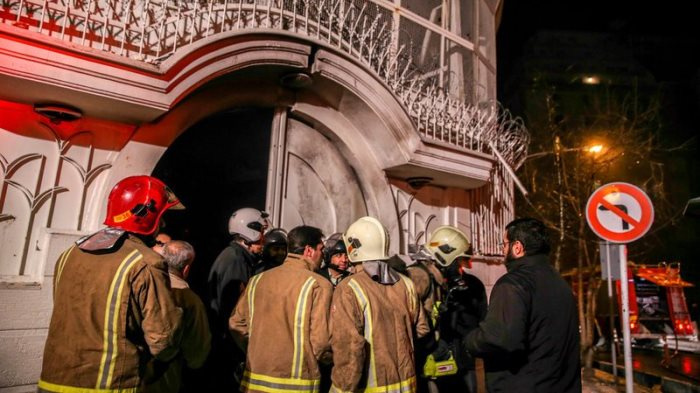The Domino of Severed Ties

(Firemen gather in front of the main gate of the Saudi Embassy in northern Tehran after it was ransacked and set on fire by a group of angry protestors. Photo: Mohammad-Reza Nadimi/ISNA)
The domino of severing ties with Iran that started from last night seems to continue. On Sunday night, Saudi Arabia’s Foreign Minister Adel al-Jubeir announced Riyadh's decision to cut ties with Tehran following the ransacking of the Saudi missions in the capital Tehran and the northeastern city of Mashhad. Protestors were furious over the execution of Nimr bin Nimr, a leading figure of the marginalized Shia community of Saudi Arabia which took place on January 2nd. In Tehran, Deputy Foreign Minister Amir Abdollahian called Riyadh’s decision to sever relations with Tehran a failed attempt to cover up its misdeed of executing Sheikh Nimr.
The domino of severing/downgrading ties has started since today noon, with Bahrain announcing its decision to cut diplomatic ties with Tehran, and the UAE and Sudan following suit. Given that relations between Tehran and Manama have been at their lowest point since the Arab Spring reached the Persian Gulf island, the decision may not come as surprising. In Bahrain, the Shia majority, some of which historically hail from Iran’s southern regions and are largely marginalized from mainstream politics took helm of a chain of pro-equality and pro-democracy protests that with its ebbs and flows has continued until the present.
The UAE, whose relations with Iran have soared in recent years, appeared more cautious. The foreign minister, Abdullah bin Zayed, congratulated Riyadh over the execution of 47 convicts, including Sheikh Nimr, on his Twitter account. Nonetheless, the sheikhdom preferred to downgrade ties with Iran, a major trade partner with a large number of expatriates in the sheikhdom, instead of cutting interactions completely. Like Saudi Arabia, Abu Dhabi has taken a tough diplomatic approach in recent years, far from the traditional conservative line of previous years.
Sudan’s decision was the most striking of the group however, given the history of close relations between this major Arab African country and Iran since the Revolution. Tehran has been steadfast in its support for the Sudanese President Umar al-Bashir. In early 2009, Parliament Speaker Ali Larijani made a prompt visit to Khartoum to express Iran’s support for al-Bashir after the International Criminal Court issued a warrant for the Sudanese President for his conduct in Darfur. Khartoum had of course showed signs of faltering relations with Tehran in recent years, with measures such as shutting down Iran’s cultural centers in its soil and expelling the Iranian cultural attaché. Recently, to Iran’s dismay, it joined the Saudi-led coalition that is fighting the Houthis in Yemen.
Sudan's turning its back on Iran may show how powerful Riyadh’s efforts are to isolate Iran in the Middle East and North Africa . Riyadh, along with some other Arab countries of the region, was strongly worried about the geopolitical ramifications of a nuclear deal between Iran and the six world powers, at times appearing pesty with its chain of complaints with Barack Obama and its various efforts to thwart or hinder the deal. The prospects of a re-empowered Iran with a stronger regional clout after conclusion of the nuclear file have been particularly worrisome for the Saudis who seem to be ready to up the ante, even by abrupt execution of a Shia figure, to stoke sectarian emotions and stop regional equations from tilting towards Iran.

